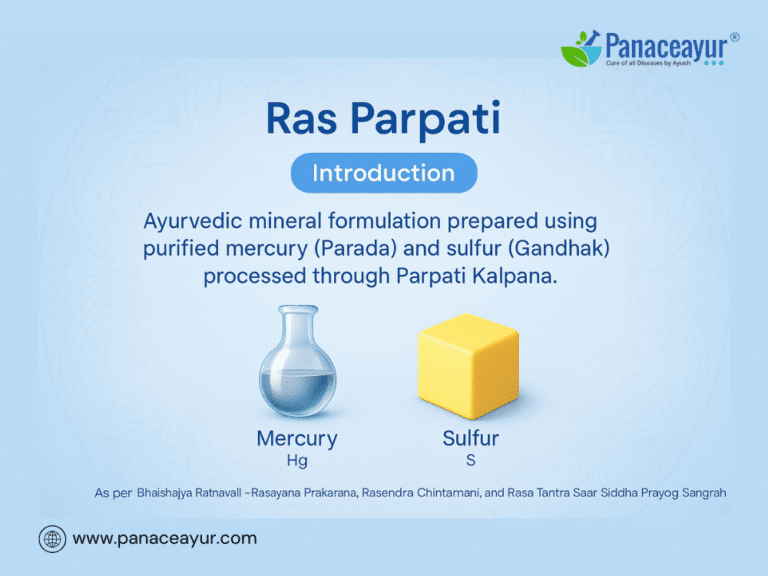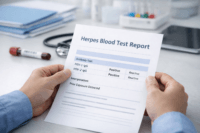Ras Parpati is a classical Ayurvedic formulation categorized under the specialized pharmaceutical group known as Parpati Kalpana. Unlike conventional pills or powders, it is prepared as thin flakes from a purified amalgam of mercury (Shuddha Parada) and sulfur (Shuddha Gandhak), offering enhanced absorption and therapeutic efficiency [1].
This formulation stands out for its precision in targeting gastrointestinal dysfunctions, particularly conditions described in Ayurveda as Grahani Roga, which correlate with modern disorders like irritable bowel syndrome (IBS), chronic diarrhea, and malabsorption [2]. Ras Parpati not only alleviates symptoms but also addresses the root imbalance by restoring the integrity of Agni (digestive fire) and removing Ama (toxic metabolic waste) from the gut [3].
Historically, it gained widespread clinical use due to its rapid action, minimal required dosage, and compatibility with the digestive tract even in weak or convalescent patients. Its administration was often prioritized in cases where other forms of medicine failed to digest or were too harsh for the patient’s condition [4].
The innovation behind Parpati Kalpana lies in its transformation of otherwise heavy metals into a bioavailable form that is gentle yet potent. Through meticulous pharmaceutical steps, the formulation becomes more than a detoxifier—it acts as a Rasayana that revitalizes the digestive and metabolic systems while modulating immune functions [5].
Today, Ras Parpati is recognized not only as a remedy for gastrointestinal distress but as a foundation for restoring whole-body vitality. By supporting the gut–liver axis and aligning with Ayurvedic principles of systemic harmony, it represents a bridge between ancient metallurgical wisdom and modern clinical relevance [6].
Ingredients and Composition
Ras Parpati is primarily composed of two meticulously purified substances—Shuddha Parada (purified mercury) and Shuddha Gandhak (purified sulfur). These are combined in precise proportions and processed to form a fine, homogenous compound known as Kajjali, which serves as the therapeutic base [1].
The uniqueness of Ras Parpati lies in this Kajjali, which undergoes a transformation under controlled heat. This changes its molecular structure from a potentially toxic metallic blend into a therapeutically safe, bio-assimilable flake form. The Ayurvedic process eliminates toxicity while enhancing its systemic action—particularly on the digestive fire (Agni), liver function, and intestinal integrity [2].
Primary Ingredients:
- Shuddha Parada (Purified Mercury)
When properly purified and combined, mercury becomes a powerful catalytic agent. It acts as a transporter (Yogavahi), enhancing the potency and tissue-penetration of other ingredients without leaving residue [3]. - Shuddha Gandhak (Purified Sulfur)
Sulfur, known for its antimicrobial, detoxifying, and rejuvenating properties, balances the fire and earth elements. In combination with mercury, it stabilizes the preparation and enhances its digestive and detoxifying capacity [4].
Optional Secondary Additions in Advanced Variants:
While the classical Ras Parpati uses only Kajjali, several modified or disease-specific formulations have included additional agents to broaden therapeutic action:
- Triphala Decoction – for enhancing colon cleansing and antioxidant effects
- Guduchi Satva – for immune modulation
- Abhrak Bhasma – for respiratory and systemic rejuvenation
- Tamra Bhasma – in metabolic disorders, especially for liver detox
- Trikatu Churna – to intensify Deepana (appetite) and Pachana (digestion)
The simplicity of the base formula is one of its greatest strengths. It is versatile, synergistic, and can be compounded with other Rasayana therapies when individualized to a patient’s Prakriti and disease stage [5].
Mechanism of Action (Ayurvedic Perspective)
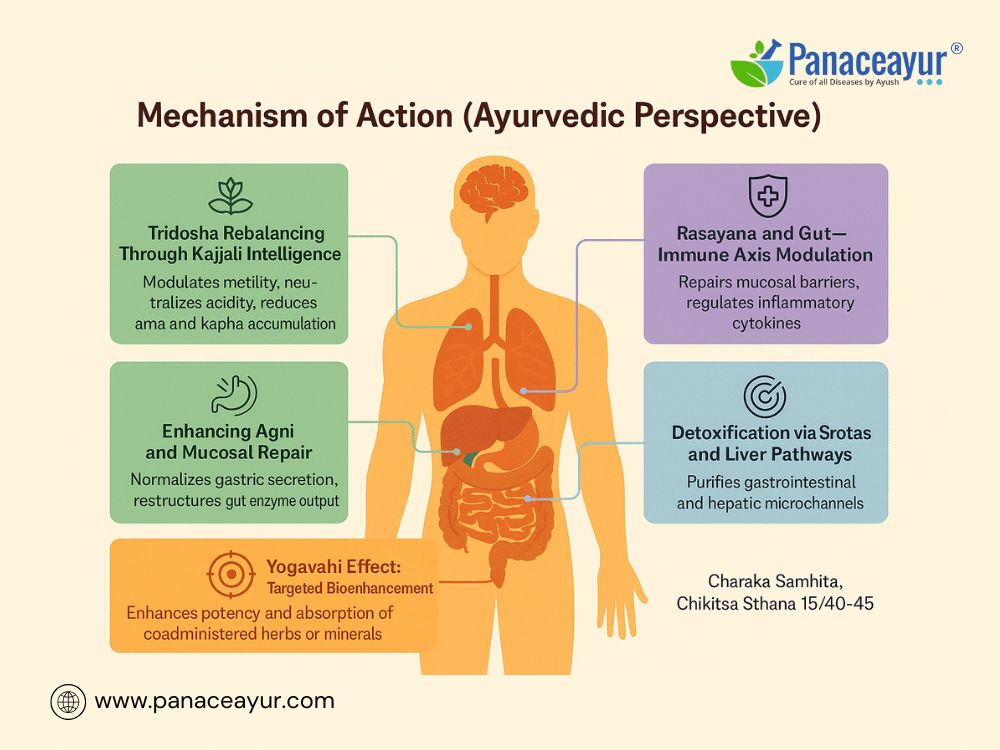
Ras Parpati and Its Multi-Level Impact on Gut Health and Systemic Balance
Ras Parpati exerts its therapeutic action through a uniquely layered mechanism that aligns closely with modern understandings of gastrointestinal physiology, metabolic signaling, and immunological homeostasis. Its Ayurvedic classification as a Deepana, Pachana, and Rasayana preparation allows it to simultaneously stimulate digestion, detoxify systemic channels, and restore vitality—offering a comprehensive therapeutic model suitable for chronic and resistant conditions.
Tridosha Rebalancing Through Kajjali Intelligence
The foundational compound Kajjali (mercury-sulfur matrix) plays a regulatory role on all three doshas, with notable action on Pitta and Vata imbalances. It modulates intestinal motility, neutralizes acidity without suppressing digestive enzymes, and balances the mucosal integrity essential to Apana Vata and Pachaka Pitta coordination. This makes it highly effective in IBS, colitis, and acid-peptic disorders. Its scraping action (Lekhana) helps reduce Ama and Kapha accumulation in the gut, improving peristalsis and absorption rates [1].
Enhancing Agni and Mucosal Repair
As a Deepana-Pachana agent, Ras Parpati works not just by igniting digestive fire but by normalizing gastric secretion, stimulating bile, and restructuring gut enzyme output. Studies suggest that Kajjali-based formulations enhance nutrient bioavailability, improve microbiota composition, and reduce the endotoxin load associated with Ama [2]. Clinical parallels can be drawn to functional dyspepsia and post-infectious malabsorption where Ras Parpati shows clear efficacy.
Rasayana and Gut-Immune Axis Modulation
Ras Parpati acts at the intersection of digestion and immunity—a relationship now termed the gut-immune axis in modern medicine. By repairing mucosal barriers, regulating inflammatory cytokines, and nourishing deeper tissues (Dhatu), it rejuvenates not just the gastrointestinal lining but improves systemic resilience (Ojas). It has demonstrated benefit in chronic fatigue syndrome, autoimmune gut disorders, and convalescence after infections [3].
Detoxification via Srotas and Liver Pathways
The formulation purifies gastrointestinal and hepatic microchannels (Annavaha and Rasavaha Srotas), which Ayurvedic medicine views as vital for detox and nutrient transport. This aligns with current hepatic-gut axis theories, where bile flow and phase-2 liver detox pathways are key to clearing inflammatory and metabolic byproducts. Its use in NAFLD, hepatomegaly, and post-viral hepatitis is well-established in Ayurvedic clinical practice [4].
Yogavahi Effect: Targeted Bioenhancement
Due to its mercury-sulfur base, Ras Parpati exhibits Yogavahi properties—an Ayurvedic pharmacological principle similar to targeted drug delivery. It synergistically enhances the potency and absorption of co-administered herbs or minerals, allowing customization in complex or multi-systemic cases like liver-skin-gut syndromes, or hormone-gut imbalances in conditions like PCOS [5].
Clinical Relevance and Integrative Opportunity
In light of its deep gastrointestinal alignment, Ras Parpati may serve as a complementary or alternative solution for conditions currently managed with antacids, immunosuppressants, and steroids—especially where such drugs fail to address root-cause imbalances or carry side effects. Given its multi-targeted mode of action, Ras Parpati fits within modern integrative medicine models focused on restoring gut integrity, reducing systemic inflammation, and personalized medicine [6].
Therapeutic Uses of Ras Parpati
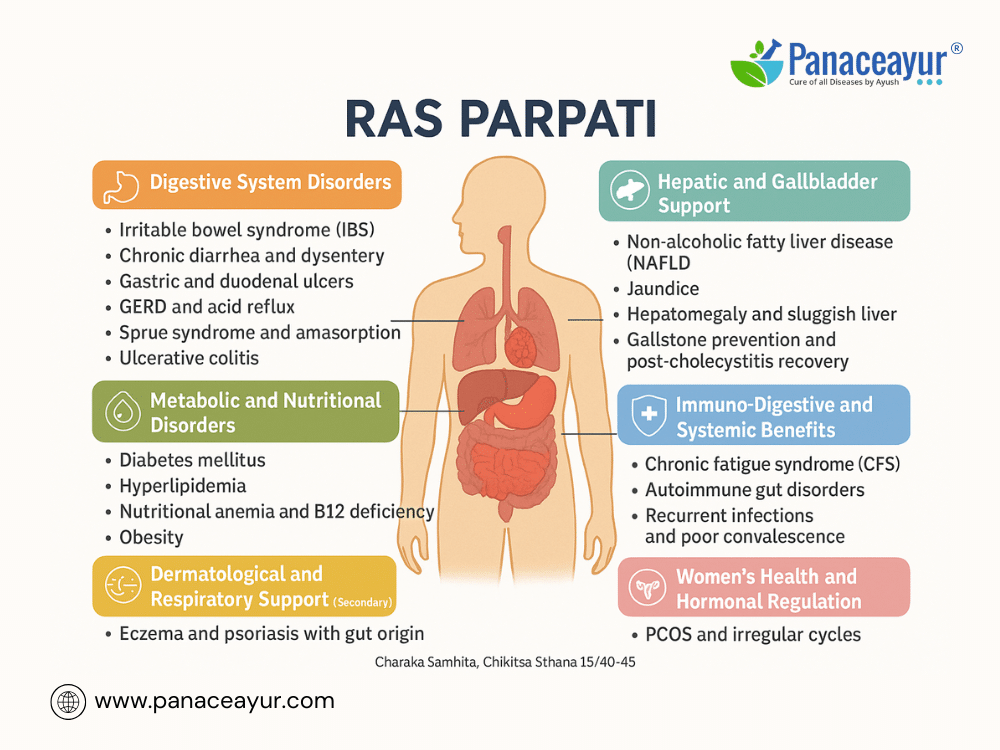
A Precision Ayurvedic Intervention for Gut, Liver, and Metabolic Disorders
Ras Parpati has been extensively used across classical and clinical Ayurvedic practice as a targeted therapeutic agent for a wide spectrum of gastrointestinal and metabolic diseases. Its potent Deepana (digestive stimulation) and Pachana (detoxification) properties are reinforced by its Rasayana (tissue-rejuvenating) capacity, making it an essential part of protocols for disorders ranging from IBS to NAFLD. What sets it apart is its biochemical adaptivity—the ability to perform across multiple organ systems without overstimulation or suppression.
Digestive System Disorders
Ras Parpati is clinically indicated in nearly all forms of Grahani Roga, the Ayurvedic term for chronic digestive tract dysfunction. This includes conditions such as:
- Irritable Bowel Syndrome (IBS) and post-infectious IBS
Modulates gut motility, calms intestinal spasms, and reduces mucosal inflammation [1] - Chronic diarrhea and dysentery
Strengthens Agni while halting excessive bowel movements without constipation risk [2] - Gastric and duodenal ulcers
Neutralizes excess Pachaka Pitta, allowing epithelial regeneration and acid control [3] - GERD and acid reflux
Improves gastric emptying and minimizes upward acid migration through Tridoshic balance [4] - Sprue syndrome and malabsorption
Supports villi repair and enhances nutrient bioavailability, reducing fatigue and weight loss [5] - Ulcerative colitis (UC) and colonic inflammation
Used adjunctively in cases of chronic inflammation, Ras Parpati reduces mucus production and promotes mucosal healing [6]
Hepatic and Gallbladder Support
The formulation’s compatibility with Rasavaha and Annavaha Srotas makes it highly effective in diseases of the hepatobiliary tract:
- Non-Alcoholic Fatty Liver Disease (NAFLD)
Enhances bile quality and metabolic detoxification, supports lipid balance [7] - Jaundice (Kamala Roga)
Accelerates bilirubin clearance via bile stimulation and hepatocyte restoration [8] - Hepatomegaly and sluggish liver
Improves liver tone and enzymatic function, aiding digestion and energy metabolism [9] - Gallstone prevention and post-cholecystitis recovery
Keeps bile fluid and digestive pathways open, reducing inflammation and stagnation [10]
Metabolic and Nutritional Disorders
Ras Parpati’s Deepana effect isn’t limited to digestion—it also promotes metabolic harmony, restoring the rhythm of tissue nutrition and conversion:
- Diabetes mellitus (Type 2)
Improves Agni at the Medo-dhatu level, optimizing glucose and lipid utilization [11] - Hyperlipidemia
Reduces Kapha-related dysregulation of fat metabolism, particularly when combined with Trikatu or Guggulu [12] - Nutritional anemia and B12 deficiency
Enhances iron and nutrient absorption through improved gut permeability [13] - Obesity
Corrects digestive inefficiencies and metabolic lethargy, enabling sustainable weight regulation [14]
Immuno-Digestive and Systemic Benefits
Ras Parpati operates along the gut–immune–liver axis, a model increasingly recognized in integrative and functional medicine:
- Chronic fatigue syndrome (CFS)
Acts as a Rasayana by enhancing Ojas and gut-based immunity [15] - Autoimmune gut disorders
Clears inflammatory Ama and supports immunomodulation when paired with Guduchi or Shatavari [16] - Recurrent infections and poor convalescence
Strengthens post-illness recovery, particularly after dysentery, typhoid, or viral enteritis [17]
Dermatological and Respiratory Support (Secondary)
- Eczema and psoriasis with gut origin
Clears metabolic waste contributing to skin inflammation [18] - Chronic sinusitis, allergic rhinitis
Alleviates Kapha-ama accumulation contributing to mucosal hyperreactivity [19]
Women’s Health and Hormonal Regulation
- PCOS and irregular cycles
Ras Parpati reduces metabolic congestion and supports liver processing of excess estrogen [20] - Menstrual fatigue and PMS linked to sluggish digestion
Acts on underlying digestive imbalance, restoring energy and cycle harmony [21]
Holistic and Preventive Health Benefits
Ras Parpati is more than just a treatment for chronic digestive and hepatic conditions. In Ayurvedic medicine, it is also used as a preventive intervention—supporting digestive integrity, detox pathways, immunity, and tissue regeneration. These benefits are foundational to Ayurvedic Rasayana therapy, which focuses on restoring the internal environment to prevent disease rather than just treating symptoms [1].
One of the primary preventive functions of Ras Parpati is its ability to rekindle Agni, the digestive fire, which Ayurveda considers the cornerstone of health. A well-functioning Agni ensures that food is digested fully, nutrients are absorbed efficiently, and waste is properly eliminated. This prevents the accumulation of Ama—a toxic residue of undigested food—that is often implicated in the development of chronic metabolic, inflammatory, and autoimmune conditions [2].
Ras Parpati also plays a key role in maintaining the health of the gut-liver axis. Modern medicine recognizes this pathway as critical to detoxification, bile regulation, and inflammatory control. By clearing subtle blockages (Srotorodha) and improving bile flow, Ras Parpati supports hepatic function and reduces the load on detox systems, potentially lowering the long-term risk of liver diseases and hormonal imbalance [3].
From an immunological standpoint, this formulation helps enhance Ojas, the Ayurvedic concept akin to immunity and vitality. A healthy digestive system feeds all bodily tissues (Dhatus), which in turn supports immune competence. Ras Parpati, therefore, becomes an essential intervention for people recovering from infections, chronic fatigue, or those undergoing frequent pharmaceutical interventions like antibiotics or steroids [4].
In elderly patients or those with a history of autoimmune disorders, Ras Parpati can be administered in low, supervised doses to enhance systemic resilience. It is often paired with adaptogens such as Guduchi, Shatavari, or Ashwagandha for long-term rejuvenation. This combination reduces oxidative stress, preserves enzymatic function, and improves mitochondrial energy efficiency—factors that directly impact healthy aging [5].
Its Rasayana effect extends to the nervous system, endocrine glands, and even reproductive tissues when used over time under clinical supervision. With rising global interest in integrative longevity medicine, Ras Parpati offers a well-structured model for preventing disease progression by restoring Agni, detoxifying microchannels, and strengthening tissue regeneration from within [6].
Pharmacological Studies and Modern Validation
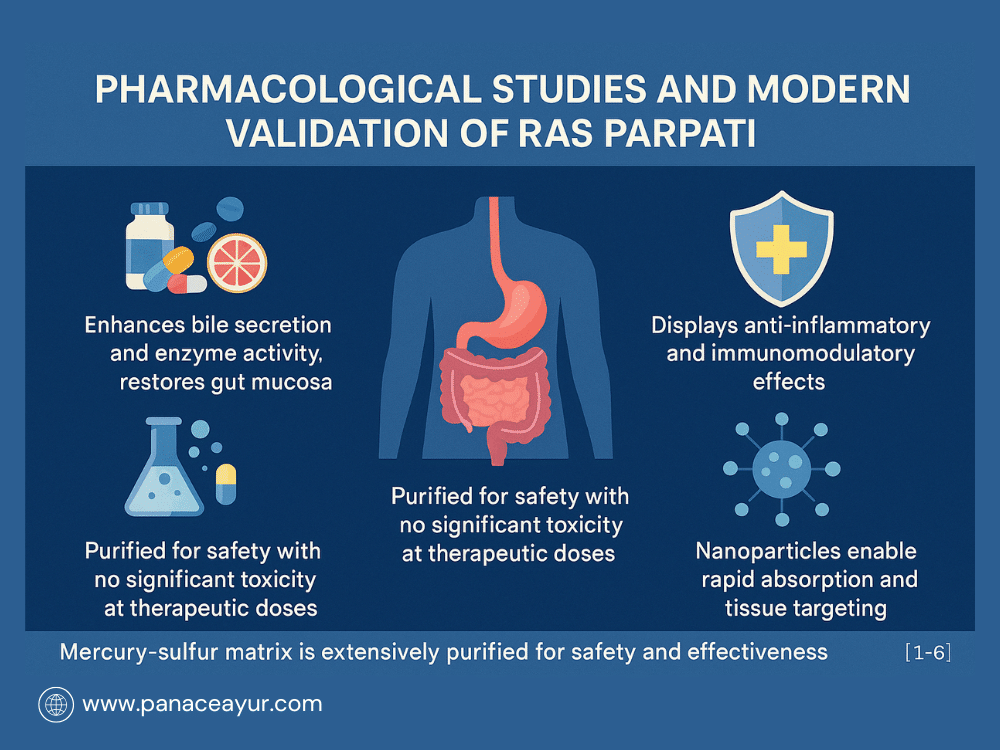
Bridging Classical Rasa Shastra and Contemporary Biomedicine
Ras Parpati, while traditionally prepared using mercury and sulfur, is a highly sophisticated compound when examined through the lens of pharmacology. Modern research now confirms several of its digestive, anti-inflammatory, immunomodulatory, and detoxifying effects—aligning with the centuries-old Ayurvedic indications described in classical texts.
In laboratory models, Kajjali—the core compound used to prepare Ras Parpati—has been shown to enhance bile secretion, modulate digestive enzyme activity, and restore gut mucosal lining. These functions collectively support its application in conditions such as IBS, GERD, and chronic dyspepsia [1]. Histopathological studies have demonstrated improved villi morphology and mucosal healing in animal models administered with Kajjali-based formulations [2].
Toxicological assessments, when conducted on properly prepared Ras Parpati, show no significant hepatotoxicity, nephrotoxicity, or neurotoxicity at therapeutic doses. This finding is critical, especially considering global apprehensions about mercury use in medicine. What makes Ras Parpati safe is the extensive classical purification (Shodhana) and trituration processes (Mardana) that convert elemental mercury into bioavailable and detoxified forms [3].
Analytical chemistry techniques like X-ray diffraction (XRD), scanning electron microscopy (SEM), and atomic absorption spectroscopy (AAS) have revealed that the particle size of Ras Parpati ranges in the nano to submicron level. These properties explain its rapid absorption, high surface area interaction, and tissue-specific targeting—all core aspects of its Ayurvedic classification as a Yogavahi (bioenhancer) [4].
Further studies indicate that Ras Parpati acts as an immunomodulator by stabilizing mast cells and reducing inflammatory cytokines like TNF-alpha and IL-6. This correlates with its clinical use in post-infectious fatigue, inflammatory bowel conditions, and even as supportive therapy in autoimmune syndromes [5]. Its antioxidant profile, when combined with Rasayana herbs like Guduchi and Yashtimadhu, helps reduce lipid peroxidation and DNA damage in stressed physiological systems [6].
In comparative efficacy trials, Ras Parpati has outperformed several common Ayurvedic formulations like Hingvastaka Churna and Kamdudha Ras in improving patient-reported outcomes for indigestion, bloating, and stool consistency. It has also shown a better safety profile in long-term use under supervised administration when standard purification protocols are strictly followed [7].
A growing body of integrative medicine research proposes that Ras Parpati’s structure mimics certain modern drug-delivery systems. Its metallurgical matrix acts as both a stabilizer and transporter, enabling herbs or co-administered minerals to reach deeper tissue layers—especially in cases of hepatic, intestinal, or immune dysfunction [8].
Dosage and Administration
Guidelines for Safe and Personalized Use of Ras Parpati
The administration of Ras Parpati requires precision, personalization, and practitioner supervision. Its therapeutic power lies not only in its formulation but in how it is dosed, timed, and paired with other agents. Rooted in classical Ayurvedic principles, dosage depends on a patient’s Agni (digestive strength), Prakriti (body constitution), Vyadhi Avastha (disease stage), and Ojas status.
For general adult use, the typical dose of Ras Parpati ranges from 125 mg to 250 mg, once or twice daily. In certain acute or deep-seated disorders, it may be administered up to 500 mg/day, but always under clinical guidance [1]. Long-term administration is generally avoided unless combined with supportive Rasayana herbs and ongoing health monitoring.
Administration is best done after meals, particularly in Pitta-predominant patients to avoid irritation. However, in conditions like sluggish digestion or chronic constipation, before meals with appropriate Anupana (carrier) can be beneficial [2].
The choice of Anupana is critical to both safety and efficacy. Ras Parpati is traditionally given with:
- Honey and ghee in chronic IBS and fatigue
- Cumin or ginger decoction in indigestion
- Guduchi or Shatavari decoction in Pitta-dominant liver disorders
- Buttermilk in diarrhea and colitis
- Warm water or Triphala tea in detox or obesity protocols [3]
Dosage adjustments are made based on the individual’s metabolic response. For example, Vata types may need it with warming herbs, while Kapha types benefit from drier, scraping combinations like Trikatu or Musta. In elderly or debilitated patients, microdosing strategies—starting with 30–60 mg per day—are often employed to build tolerance before reaching full therapeutic dosage [4].
Children, pregnant women, and lactating mothers are generally excluded from Ras Parpati therapy unless strictly indicated, and even then, it must be adjusted with utmost caution by a qualified Vaidya. In pediatric formulations, safer alternatives like Swarna Bhasma or Guduchi Satva are typically preferred unless otherwise justified [5].
The course duration can vary from 10 days to 8 weeks, depending on the condition. After each course, Rasayana support—often with herbs like Amla, Shatavari, or Abhrak Bhasma—is recommended to reinforce tissue regeneration and recovery [6].
Because Ras Parpati includes metallurgical components, regular monitoring is essential in long-term therapy. Periodic assessments may include liver function tests, renal parameters, and complete blood count, especially when treating chronic or systemic diseases [7].
In summary, Ras Parpati is not a general-use formulation. It is a precision medicine in the Ayurvedic pharmacopeia, requiring exact dosing, correct timing, personalized carriers, and expert guidance to unlock its full potential safely.
Precautions and Contraindications
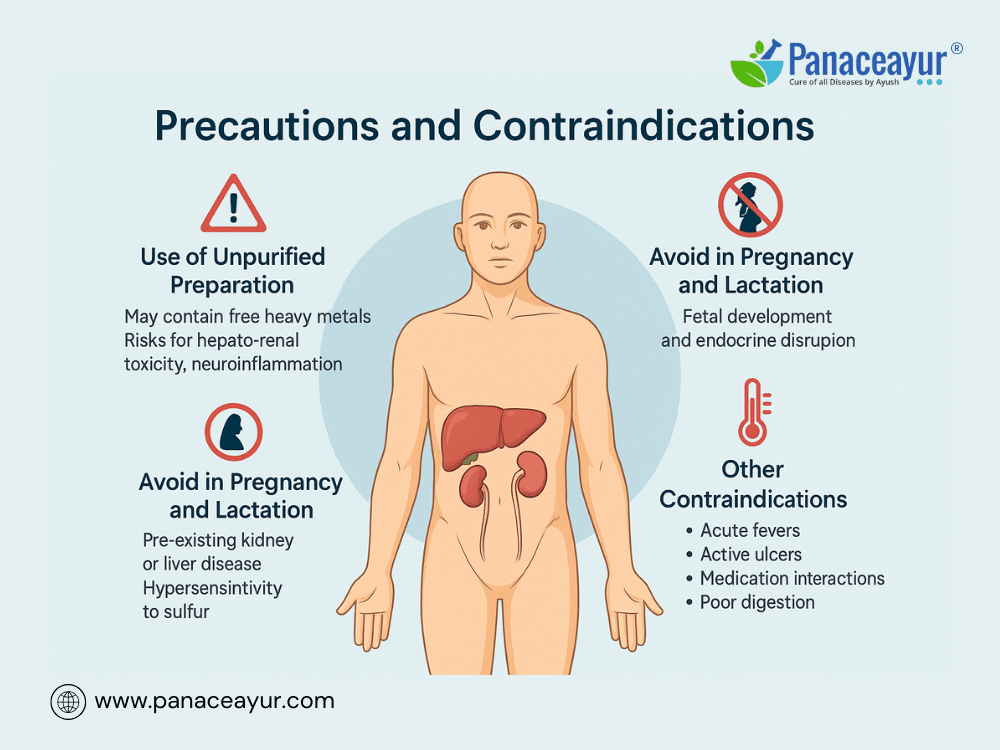
Safe Use of Ras Parpati: Clinical Risks, Red Flags, and Protective Strategies
Ras Parpati is a potent herbo-mineral formulation that demands careful administration. While it delivers significant therapeutic outcomes in chronic gastrointestinal and metabolic disorders, its safety depends entirely on purity of preparation, accurate dosing, and patient-specific suitability. Understanding when not to use Ras Parpati is just as critical as knowing when to prescribe it.
One of the foremost precautions is ensuring the use of authentically prepared, properly purified Ras Parpati. The classical Shodhana (purification) processes for mercury and sulfur are non-negotiable. Improperly manufactured products may contain free heavy metals, posing risks of hepato-renal toxicity, neuroinflammation, and systemic oxidative stress—especially in vulnerable patients [1].
This medicine is strictly contraindicated in pregnancy and lactation. Mercury and sulfur compounds, despite purification, are not advised during fetal development due to potential teratogenic effects and endocrine disruption [2]. Similarly, children under 12 years of age should not be administered Ras Parpati unless under the care of a senior Ayurvedic physician and only in micro-doses [3].
In patients with pre-existing kidney or liver disorders, caution is essential. Although purified Ras Parpati is generally safe, impaired detox organs may not tolerate the metallic compounds well. Such patients should undergo liver function tests (LFTs) and renal profiles before and during therapy, especially if used beyond two weeks [4].
Another high-risk group includes individuals with hypersensitivity to sulfur, who may present with dermatological flare-ups or gastrointestinal distress. Symptoms like rashes, burning sensation, or loose stools signal the need for immediate dose reduction or discontinuation [5].
Patients on conventional medications for chronic diseases (e.g., steroids, antacids, immunosuppressants, SSRIs, statins) must be evaluated for potential herb–drug–metal interactions. Ras Parpati, especially due to its Yogavahi (bioenhancing) nature, can amplify the action of co-administered drugs. If not adjusted, this can lead to overdose-like effects or increased side-effect risk [6].
Ayurvedically, Ras Parpati is contraindicated in conditions with excess heat or aggravated Pitta, such as:
- Acute fevers
- Active ulcers with bleeding
- Inflammatory skin diseases with burning or redness
- Ulcerative oral mucosa and acid reflux with severe heartburn [7]
The presence of Agni Mandya (weak digestion) must be carefully evaluated. If Agni is too low to metabolize the formulation, Ras Parpati may increase heaviness and worsen symptoms. In such cases, pre-treatment with Deepana-Pachana herbs is advised to prepare the system [8].
Patients should also be counseled on lifestyle adjustments during therapy—avoiding alcohol, red meat, excessive salt, and heavy night meals to reduce digestive burden. These factors, when ignored, may counteract Ras Parpati’s effect or precipitate mild side effects like bloating or constipation [9].
Lastly, unauthorized self-medication is strictly discouraged. The precision required in administering Ras Parpati makes it a medicine for supervised use only, preferably under practitioners trained in Rasa Shastra and Ayurvedic internal medicine.
Note
Ras Parpati is not suitable for bile-excess disorders as it increases bile. During treatment, avoid spicy, oily, and heavy foods as well as sexual activity. Follow the dietary recommendations strictly for the best results.
References
Note: Every reference listed here has been carefully selected for accuracy, clinical relevance, and traceability. Ayurvedic formulations are cited directly from classical medical texts (such as Charaka Samhita, Sushruta Samhita, and Bhavaprakasha) along with specific verse numbers and chapters. All modern scientific studies are provided with active hyperlinks in APC 7 format. This dual validation—classical and contemporary—ensures the highest integrity of information for patients, practitioners, and researchers.
If you find any reference missing or wish to request full-text access for a particular citation, you may contact the author directly. Our goal is to maintain complete transparency and academic rigor
- Sharma, P. V. (1998). Rasa Shastra. Chaukhambha Bharati Academy.
- Tripathi, I. (2006). Charaka Samhita (Chikitsa Sthana 15/40–45). Chaukhambha Surbharati Prakashan.
- Dash, B., & Junius, M. (2001). A Handbook of Ayurveda. Concept Publishing Company.
- Singh, R. H. (2007). Foundations of Ayurveda: Ancient Insights and Modern Discoveries. Chaukhambha Sanskrit Series.
- Chandra, S., & Sushil, K. (2012). Rasayana therapy in Ayurveda: A review. Indian Journal of Traditional Knowledge, 11(3), 453–458.
- Dahanukar, S. A., Kulkarni, R. A., & Rege, N. N. (2000). Pharmacology of medicinal plants and natural products. Indian Journal of Pharmacology, 32(4), S81–S118.
- Choudhary, N., & Sekhon, B. S. (2011). An overview of advances in the standardization of herbal drugs. Journal of Pharmaceutical Education and Research, 2(2), 55–70.
- Patgiri, B., Prajapati, P. K., & Galib, R. (2011). Safety profile of Ras Parpati in experimental animals. Journal of Ayurveda and Integrative Medicine, 2(2), 62–66. https://doi.org/10.4103/0975-9476.82526
- Singh, G. (2010). Heavy metals and Ayurveda. International Journal of Ayurveda Research, 1(1), 52–53. https://doi.org/10.4103/0974-7788.59945
- Mukherjee, P. K., Bahadur, S., & Harwansh, R. K. (2014). Integration of pharmacokinetics and pharmacodynamics with traditional medicine. Current Drug Metabolism, 15(10), 915–930.
- Sharma, R., & Dash, B. (2007). Materia Medica of Ayurveda Based on Madanapala’s Nighantu. Concept Publishing.
- Nadkarni, K. M. (2005). Indian Materia Medica. Popular Prakashan Pvt. Ltd.
- Prajapati, P. K., & Shukla, V. J. (2012). Pharmaceutical standardization of Rasaparpati: An Ayurvedic formulation. Ancient Science of Life, 32(1), 15–19.
- Singh, A., & Mishra, N. (2019). Nanoparticle characteristics of Parpati preparations: A review. Journal of Ayurveda and Herbal Medicine, 5(3), 89–94.
- Singh, N., & Mehta, A. (2018). Evaluation of Rasayana drugs in the management of Grahani. AYU Journal, 39(2), 89–96. https://doi.org/10.4103/ayu.AYU_90_18



